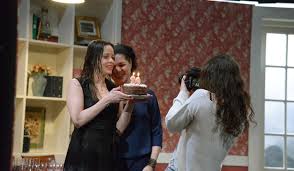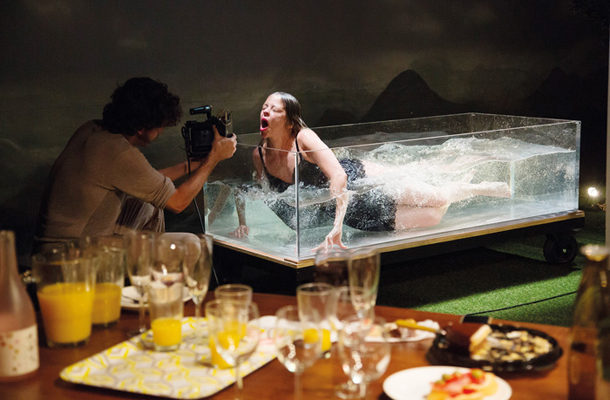There’s a pair of wonderful lines somewhere near the opening of Stephen Sondheim’s decades old musical, Pacific Overtures that introduce and contextualize much of the drama that follows; and also, in typical Sondheim fashion, open our eyes to another world—not simply the imperial Japan invaded by Admiral Peary, but another dimension of being, seeing and meaning.
That line came back to me a day or so after I took in some part of Christiane Jatahy’s What If They Went to Moscow? at its last REDCAT performance.
“In the middle of the world we float … in the middle of the sea
The realities remain remote … in the middle of the sea.
“Kings are burning … somewhere….
Not here — . . . ”
The character—Maria (Stella Rabello), one of the three sisters at the heart of the drama—is in a pool—in the actuality of the stage production, a transparent glass tub in which she floats for a few moments before lifting herself to its edge. She speaks of the stillness of the moments spent floating, a state of floating consciousness, acutely self-aware in the moment, aware of the ‘shape’, the quality of the moment, the sensation of time’s passage (or its absence), while awakening to her consciousness of an impending change. She conveys the sense of shifting awareness and perception of time, and the impending changes of her life.
 As the action unfolds, we’re made aware that it’s a moment of convergence for her on several levels—of real life experience some time past, as well as a “utopia of the other”—the life she persists in yearning for; the life that, despite her latent cynicism, she might once have engaged as a realistic possibility, even through the intervening years of disillusionment; and the speculative future that hangs in the air like a mirage.
As the action unfolds, we’re made aware that it’s a moment of convergence for her on several levels—of real life experience some time past, as well as a “utopia of the other”—the life she persists in yearning for; the life that, despite her latent cynicism, she might once have engaged as a realistic possibility, even through the intervening years of disillusionment; and the speculative future that hangs in the air like a mirage.
In the next shift of scene, we’re moved to a verandah where time again moves back and forth—between the moment a year before when the sisters’ father was killed running an errand and the anniversary they’ve actually gathered to celebrate, Irina’s twentieth birthday (her ‘name day’ in the Chekhov play). As Maria stands paralyzed, grieving both her current life and the abrupt, senseless end of her father’s the year before, Irina bustles in and out from the ‘interior’ of the house (it is amazing what can be done on stage with simple glazed partitions) with her new camera, which takes on a dual function as both Irina’s own camera and point of view, and a stand-in for the swirl of cameras that move about the stage translating the stage action into live-cinema. Considered as a whole, Jatahy’s play might itself be considered a multi-layered work of translation. (Jatahy and her actors exploit this theatrically in their broken (or glazed) ‘fourth wall’ address of the audience, shifting easily between Brazilian Portuguese and passages of English dialogue.)


